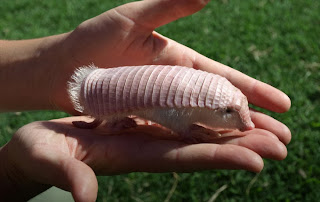Be aware that I don't choose these things. In my never-ending thirst for knowledge, they come to me, attracted, no doubt, by a mixture of curiosity and disbelief.
This thing, this whatever-it-is, like a shrimp shell with fur, or a hamster trick-or-treating in a lobster suit - it scares me to think that these things are scampering around, apparently cute except for the four-inch talons that could probably rip your throat out if you looked at it wrong. It was hard for me to believe it was real, so I had to dig around for more images, sort of like turning over rocks in your back yard to see what slimy things you can find.
This looks like a sea monkey, only bigger. It looks like a sea monkey might look if it actually stayed alive and grew into something, rather than dying in the first week and turning to brown scum on top of the water.
Then I found one that moved. . .
This primitive, struggling, fur-clogged thing, this thing that looks like it should have died out millions of years ago along with the trilobite, is an animal so primitive, so small-brained, that when you lift it off the ground it keeps working its feet because it thinks it's still walking.
Having proven it actually exists and isn't just some taxidermic hoax, I had to Wiki it (my main source of knowledge these days), and found the following:
Pink fairy armadillo
From Wikipedia, the free encyclopedia
| Pink fairy armadillo[1] | |
|---|---|
 | |
| Conservation status | |
| Scientific classification | |
| Kingdom: | Animalia |
| Phylum: | Chordata |
| Class: | Mammalia |
| Order: | Cingulata |
| Family: | Dasypodidae |
| Subfamily: | Euphractinae |
| Genus: | Chlamyphorus Harlan, 1825 |
| Species: | C. truncatus |
| Binomial name | |
| Chlamyphorus truncatus Harlan, 1825 | |
| Pink fairy armadillo range | |
The pink fairy armadillo is approximately 90–115 mm (3.5-4.5 inches) long, excluding the tail, and is pale rose or pink in color. It has the ability to bury itself completely in a matter of seconds if frightened.
It is a nocturnal animal. It burrows small holes near ant colonies in dry soil, and feeds mainly on ants and ant larvae near its burrow. Occasionally, it feeds on worms, snails, insects and larvae, or various plant and root material.
The pink fairy armadillo spends much of its time under the ground, as it is a "sand swimmer" similar to the golden mole or the marsupial mole.[citation needed] It uses large front claws to agitate the sand, allowing it to almost swim through the ground in a manner reminiscent of swimming through water. It is torpedo-shaped, and has a shielded head and back.
The above picture may well be a hoax. I don't think it's a pink fairy armadillo, or any sort of armadillo. Take a look at those feet - they're made out of cantaloupe spears. Carmen Miranda could wear this thing on her head! And the eyes are far too big, made of blueberries or, perhaps, black olives.
Pink fairies no longer scare me, not if they're actually edible.
But worse horrors awaited me. Salamanders. Giant salamanders. Giant salamanders that thrashed violently in people's arms. Salamanders that attacked. This one looks like a mammoth Chee-toh or a pizza gone terribly wrong. Except it seems to be made out of some sort of vinyl.
When I was a kid, I always wanted a newt, a toad, a mudpuppy, whatever I could catch that crawled or slithered. I would have loved to collect a salamander, but I never saw one, just read about them. Now I realize I was saved by the grace of God, by a divine Providence that snatched me out of the path of the Behemoth. What would these things eat? Why do they exist at all? What is evolution all about, and why is ANY of it here, when we started off as nothing?
I don't know if this cheers me up, or not.













